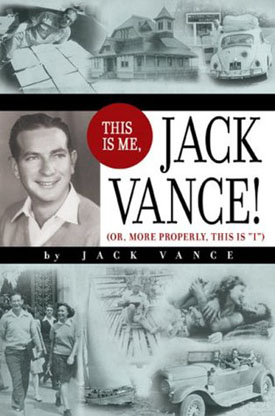 Jack Vance has been one of the most continuously productive and popular and arguably one of the most influential writers of science-fiction. He’s also a mystery writer of note. (His is a name that I see popping up again and again in interviews with writers, and anyone who doubts the first part of that summation need only look at his bibliography, enough for a book itself.) Now, at the age of 93, he has finally released his autobiography, a disarming book that leaves us with not only a vivid picture of Vance’s life, but some insights into his writing.
Jack Vance has been one of the most continuously productive and popular and arguably one of the most influential writers of science-fiction. He’s also a mystery writer of note. (His is a name that I see popping up again and again in interviews with writers, and anyone who doubts the first part of that summation need only look at his bibliography, enough for a book itself.) Now, at the age of 93, he has finally released his autobiography, a disarming book that leaves us with not only a vivid picture of Vance’s life, but some insights into his writing.
Vance was born to well-to-do, socially prominent parents in San Francisco, where he spent his early years. When his parents separated, his mother took Jack and his siblings to her father’s ranch near the Sacramento delta. Vance’s description of these events is quite low-key, and it takes a bit of reading between the lines to piece it all together, although he makes it easier in this case with repeated references to his father’s sister, who was not only somewhat meddlesome but seems to have had her own agenda, starting with persuading his older brothers to move back to San Francisco. The family dynamics are fascinating, if somewhat mysterious, but, although Vance never says so in so many words, the aunt really must have been a piece of work. The vicissitudes of his early life are handled in a similarly understated fashion.
It’s this reticence that, I think, gives Vance’s autobiography much of its appeal. He’s always been a deceptive writer — one comes away from his books and stories with a sense that, under the uninflected diction and bare-bones rendering of events are a lot of pieces that need to be put together. It’s the same here. He doesn’t talk much about his writing, a fact that he points out in his “Preliminary Remarks” (a heading he chose because, as he says, the “usual designations seems rather too formal”). His reputation, he says, rests on literary production, but writing has not been the “sole function” of his life. And this is about his life.
There is a quality in this book, as there is in Vance’s fiction, that we used to call a sense of wonder, a wide-eyed look at a world in which everything is an adventure and life’s lessons, no matter how ruefully one looks back at them sometimes, are a preparation for the next part of the voyage. I think maybe that’s the word I would use to describe This is Me — a voyage. So hop aboard.
(Subterranean Press, 2009)
